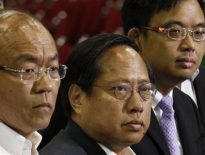(Reuters) – A heavily armed border crossing between North and South Korea that allows the North access to $2 billion in trade a year, one of its few avenues to foreign currency, remained open on Thursday despite Pyongyang’s move to cut communications.

North Korea on Wednesday severed the last of three telephone hotlines with South Korea as it readied its troops to face what it believes to be “hostile” action from Seoul and Washington. The phone line is used to regulate access to the Kaesong industrial park on the North Korean side of the border as well as for military communications with the South.
Nearly 200 South Koreans and 166 vehicles carrying oil and materials drove into the park just inside the North early on Thursday after North Korean authorities used a separate phone line from the park’s management office to allow access, South Korean officials said.
The North has already cut a direct hotline to U.S. military forces stationed in South Korea and a Red Cross line that had been used by the governments on both sides.
Severing hotlines is one of the least threatening but symbolic things Pyongyang can do to raise tensions and at the same time pressure Seoul and Washington to restart dialogue, said Yang Moo-jin of the University of North Korean Studies in Seoul.
North Korea periodically cuts the lines. Its latest moves follow U.N. sanctions imposed for its February 12 nuclear test and routine drills by South Korean and U.S. forces. Pyongyang has also scrapped an armistice that ended the 1950-53 Korean War.
“What else can they do? Actually start a war?” said Yang.
“Not answering the phone and saying the armistice is not valid any more, that’s what they can do and they’ve done this before.”
NORTH STILL ACCEPTING US DOLLARS
Workers and traders crossing the world’s most heavily militarized border made sure they had U.S. dollar bills for the trip, some borrowing from a co-worker so they had enough of the zone’s officially accepted currency.
Pyongyang’s rhetoric against Washington including a vow to attack its military bases in the Pacific and to stage a nuclear strike has not yet extended to its willingness to accept dollars, which South Koreans said they had to use to buy cigarettes and other goods in the zone.
“I am a bit nervous but it looked the same as before when I went in there yesterday,” truck driver Park Chul-hee, 44, told Reuters outside the Paju customs office. North Korean soldiers in and around Kaesong had been wearing combat fatigues recently, he added.
The North-South military hotline was used on a daily basis to process South Koreans and vehicles across the border and in and out of the Kaesong project, where 123 South Korean firms employ more than 50,000 North Koreans to make household goods.
About 120 South Koreans remain in the park on an average day. The presence of South Koreans at Kaesong poses a potentially serious political risk for Seoul given they could be trapped if Pyongyang sealed the border.
The first of the 511 people and 398 vehicles who were scheduled to return from the zone on Thursday began crossing the border into the South, indicating the crossing was operating normally in both directions.
“I think the third nuclear test is the last tipping point. I was worried so I came out,” said one South Korean who has been running a factory in Kaesong for six years and who requested anonymity due to the sensitivity of the issue.
Few people believe the North will shut down the project.
The $2 billion a year it generates reduces Pyongyang’s dependency on China, which accounted for almost $6 billion in trade in 2012, according to South Korean government estimates.
Kaesong also generates more than $80 million a year in cash in wages. This is paid to the state rather than to workers.
(Writing by Jack Kim, Editing by Dean Yates)





